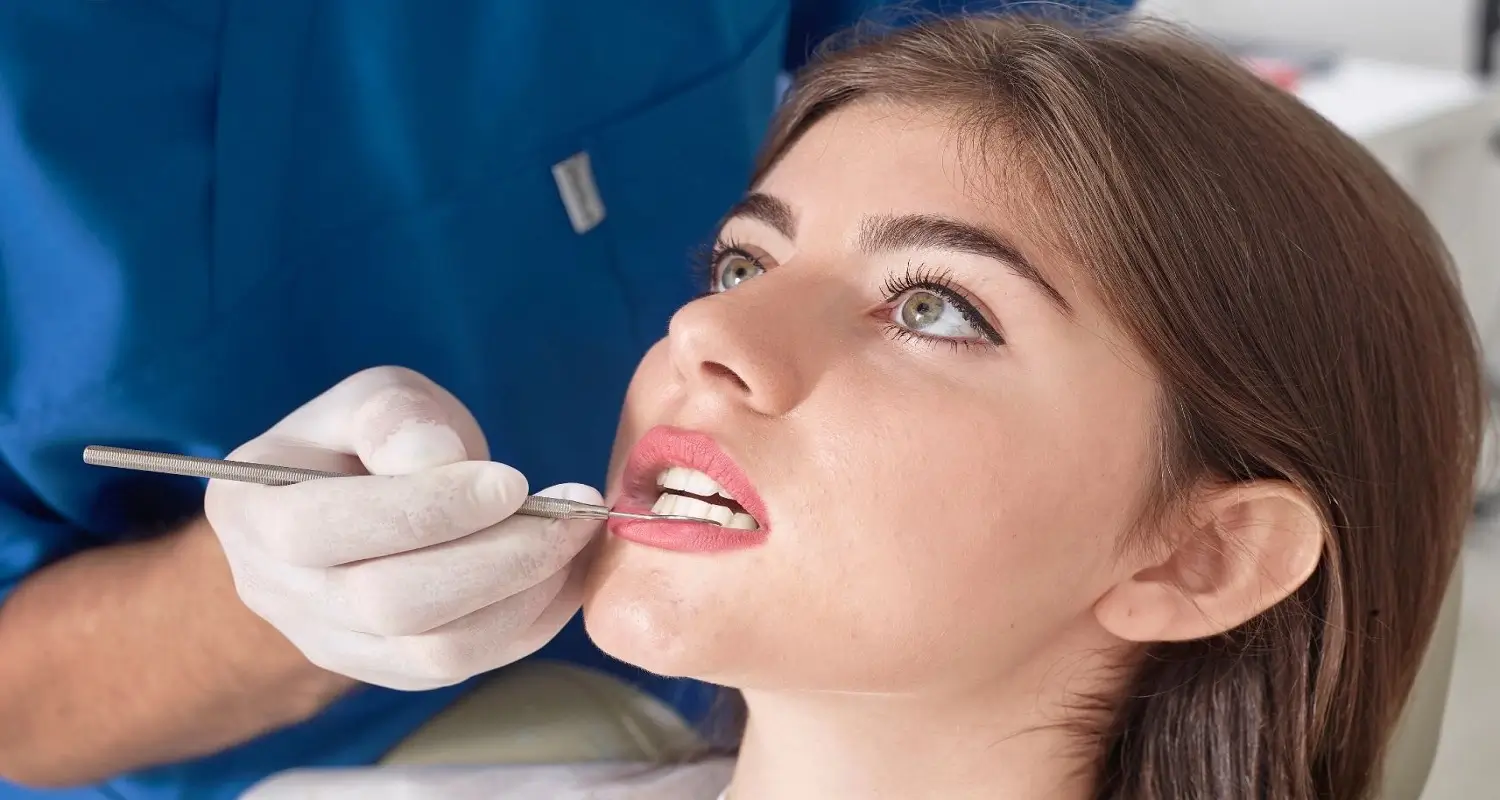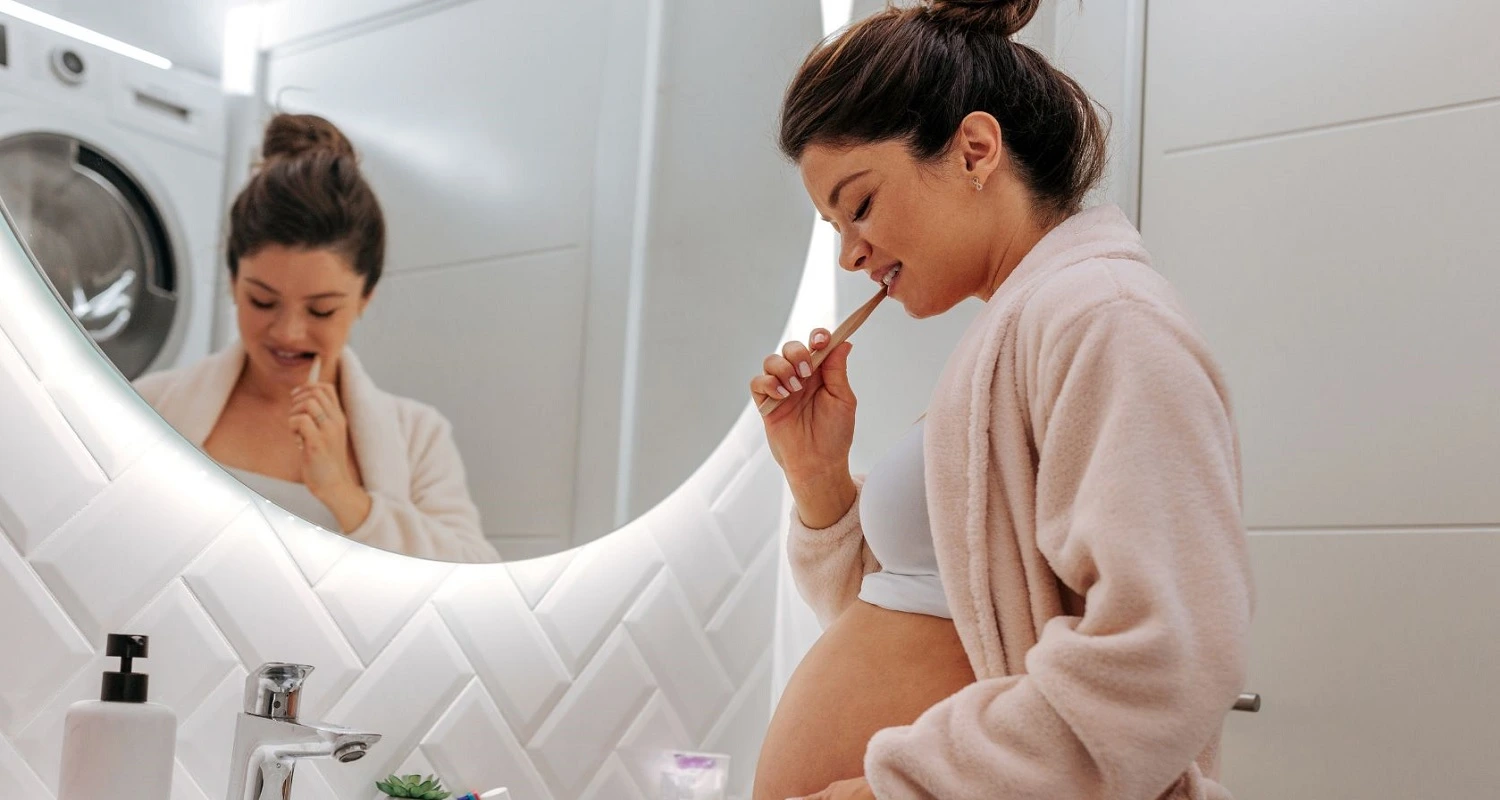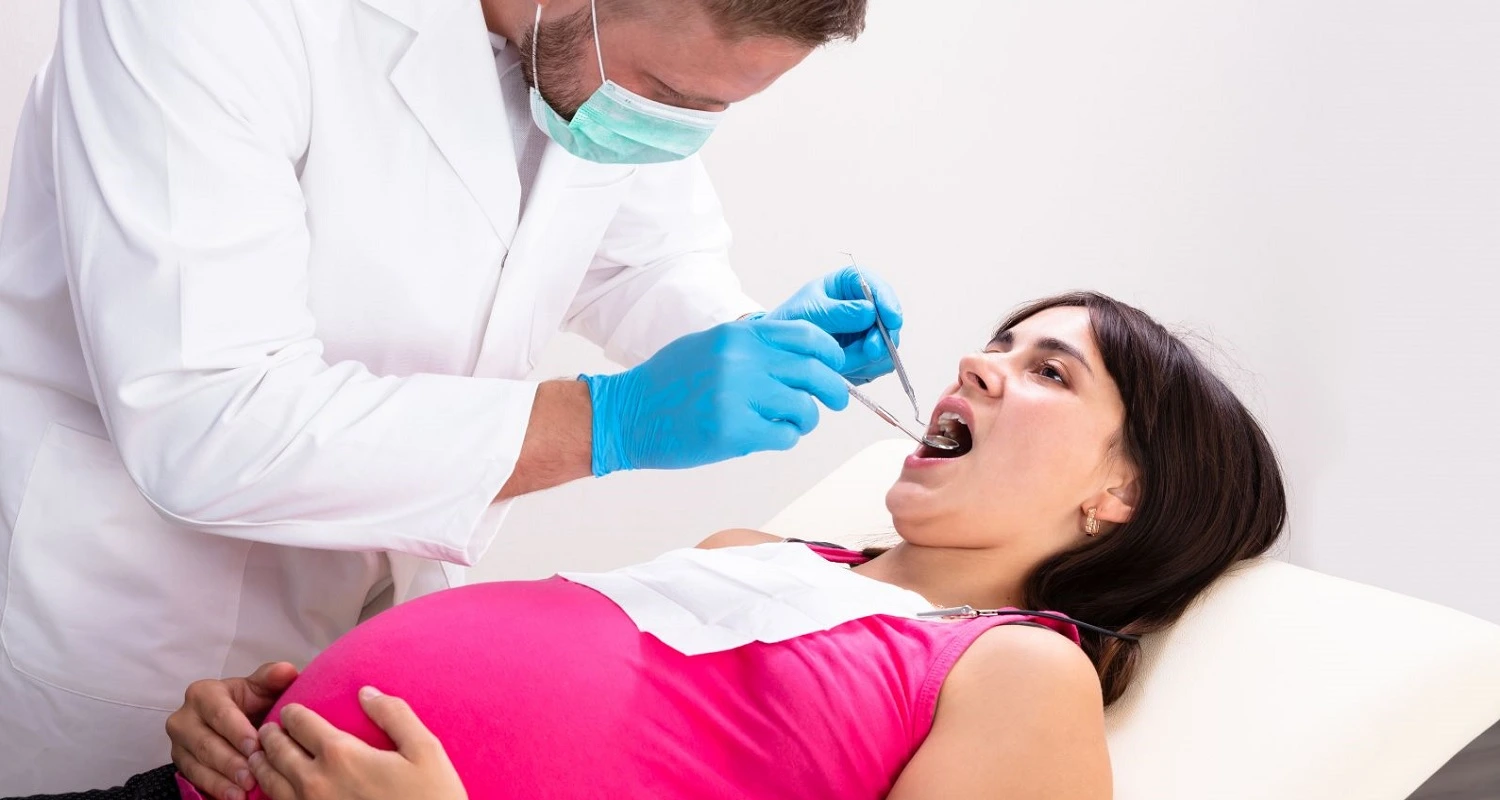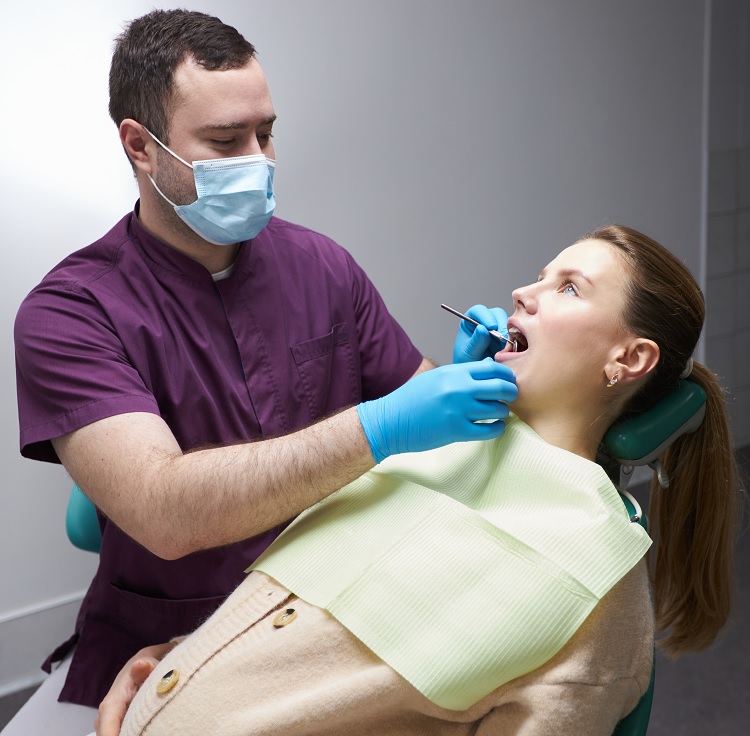Last Updated on: 2nd January 2026, 07:14 am
How to prevent losing teeth during pregnancy? While the belief that “for every pregnancy, a tooth is lost” is common, not all pregnant women experience tooth loss naturally. Prioritize dental health with good hygiene and regular check-ups to reduce the risk. The truth is that various conditions can arise during pregnancy that can lead to tooth loss if proper care is not taken. However, the good news is that not all pregnant women lose their teeth, and in this post, we will tell you why.
Pregnancy and Dental Health
Is it true that losing teeth during pregnancy is normal?
The short answer is no. Although pregnancy involves hormonal changes that make women more susceptible to certain dental health problems, if there is prevention and proper care, it is possible to maintain all teeth in good condition.
Is it true that pregnancy steals calcium from the teeth?
Although this is a common belief, the baby does not steal calcium from the teeth. Teeth can become decalcified due to other factors during pregnancy, such as frequent vomiting, excessive intake of sugars, and lack of dental hygiene.

Common Dental Problems During Pregnancy
During pregnancy, several changes occur in the body that can predispose to multiple problems in oral health, including:
1. Gingivitis and periodontal disease
Hormonal changes can cause the body to respond to the presence of bacteria excessively, causing severe inflammation that can manifest with red and bleeding gums, which is even worse if there are poor hygiene habits. When the inflammation of the gums progresses, the underlying bone that supports the teeth can be destroyed, leading to what is known as periodontal disease.
2. Cavities
Cavities are the formation of holes in the teeth, generated by the degradation of dental tissue (demineralization) from the acids produced by bacteria when they break down sugars. In this way, several special conditions during pregnancy can increase the risk of cavities:
• Poor hygiene: Many women suffer from nausea, especially during the first months of pregnancy, and contact of the back of the throat with the toothbrush can increase those feelings of vomiting. For this reason, some of them do not perform oral hygiene with the same frequency, which increases the risk of cavities, and other diseases and might result in losing teeth during pregnancy
• Vomiting: Vomiting facilitates the arrival of stomach acids that digest food to the mouth and cause damage to the teeth.
• Changes in the diet: Part of the hormonal changes that occur during pregnancy can increase the consumption of sugary foods, which favors the appearance of cavities. It is also common for pregnant women to consume food in the middle of the night and then go back to sleep without proper oral hygiene, further increasing the risk of cavities.
3. Dental erosion
Morning sickness and some cravings can expose teeth to wear from contact with acids, which is known as dental erosion. This wear and tear can affect the shape of the teeth, causing aesthetic problems, dental pain, dental sensitivity, and loss of teeth during pregnancy.
4. Excessive saliva production
This condition is medically known as ptyalism. A person with this condition could produce more than 2 liters of saliva a day. It can occur from the first weeks of pregnancy. Generally, it disappears after the first trimester; however, in some cases, it only ceases until the moment of delivery.
5. Pyogenic Granuloma
It is a small benign mass of soft tissue that can appear on the gums. It has also been called gravidarum granuloma, as it is generally produced by hormonal changes during pregnancy. The treatment varies depending on its advancement, but generally, it does not involve complex procedures.
A dental granuloma is an inflammation that usually occurs at the end of a tooth’s root. Often a consequence of long-standing infection, it can lead to discomfort and swelling. Check the article for detailed information on its origins, symptoms, and treatments.

How to Prevent Tooth Decay or Losing Teeth During Pregnancy?
1. Strict dental hygiene
The best way to prevent the appearance of cavities, and gum diseases and to avoid losing teeth during pregnancy is by adopting good hygiene habits. Therefore, it is recommended to:
• Brush your teeth 3 times a day with a soft-bristled toothbrush and a small head, to decrease the sensation of nausea.
• Use fluoride toothpaste daily.
• Clean the spaces between teeth with dental floss at least once a day.
• Use fluoride mouthwash at least once a day.
• Always brush your teeth after consuming sweet or sticky foods.
2. Attend dental appointments
• Preparation before pregnancy: It is recommended that if pregnancy is planned, the mother should attend a dental consultation before conceiving, because many women of childbearing age may have cavities and other dental problems that they are unaware of. If any tooth requires treatment during pregnancy, it may be even more uncomfortable for the mother to attend a consultation. Likewise, if dental infections occur during pregnancy, this could affect the baby’s health.
• Prevention and early detection: From the first months of gestation, it is important to perform an initial dental assessment of the teeth’ initial condition to detect possible initial problems and prevent their advancement.
• Fluoride application: Fluoride is an element that, when applied by the dentist on the surface of the teeth, strengthens them and minimizes the effects of cavities and erosion.
• Regular check-ups: It is usually recommended that adults visit the dentist every 6 months. However, in pregnant women, it is recommended that they attend dental check-ups at least 3 times during the gestation period to prevent.
3. Healthy diet
The consumption of healthy foods and the decrease in the intake of sugary foods and drinks not only reduces the risk of oral diseases and to prevent losing teeth during pregnancy but also favors the mother and baby’s health.
4. Rinse with water and baking soda after vomiting
The American Dental Association recommends that after vomiting, patients avoid brushing their teeth immediately, as dental brushing in the presence of stomach acids could cause further damage to the enamel. Therefore, instead of immediate brushing, it is advisable to rinse the mouth with a solution containing 1 tablespoon of baking soda diluted in 1 cup of water. This will help neutralize the acid and protect the teeth.

Dental Treatment During Pregnancy
1. When to perform it?
Although dental treatment is considered safe at any time during pregnancy, the mother may feel more comfortable during the second trimester. During the first few months, nausea is more common and may make it difficult to attend, while in the last trimester, the weight of the baby may make the mother feel uncomfortable or dizzy in the dental chair.
However, although for the reasons mentioned it may be more comfortable to perform procedures between 3 and 6 months of gestation, it is always recommended to perform a dental assessment from the first month.
2. Is the dental treatment safe during pregnancy?
• Preventive dentistry procedures, diagnostic examinations, and dental restoration are safe during pregnancy.
• Taking dental x-rays during pregnancy is safe, as long as adequate protection with a lead apron covering the torso and neck is used.
• There are safe-to-use anesthetics during pregnancy, so this does not represent an obstacle for dental care.
Conclusion
Although the belief that losing teeth during pregnancy has been widely spread, it is now known that a pregnant woman can keep her teeth healthy as long as she regularly visits the dentist and follows some care recommendations.
If you are planning a pregnancy or are already pregnant, you can contact us at Channel Islands Family Dental, as well as on our Facebook page. We look forward to your visit for a timely diagnosis. Our dentists in Oxnard, Santa Paula, Ventura, Newbury Park, and Port Hueneme can guide you on prevention and the best procedures to care for your smile.
Share:
References
1. Pregnancy Gingivitis: Causes, Treatment & Prevention. (s. f.). Cleveland Clinic. https://my.clevelandclinic.org/health/diseases/22484-pregnancy-gingivitis
2. Does Pregnancy Made Your Teeth Decay and Fall Out? (Nov 18, 2022). Health. https://www.health.com/condition/pregnancy/can-pregnancy-make-teeth-fall-out
3. Pregnancy and Dental Work (Dic 9, 2021). American Pregnancy Association. https://americanpregnancy.org/healthy-pregnancy/is-it-safe/dental-work-and-pregnancy/
4. El embarazo y la salud de los dientes: ¿mito o realidad? HealthyChildren.org. https://www.healthychildren.org/Spanish/ages-stages/prenatal/Paginas/Pregnancy-and-Oral-Health-Truth-or-Fiction.aspx
5. Lonzer, J. (2021, abril 28). Oral hygiene and dental care during pregnancy. Consult QD. https://consultqd.clevelandclinic.org/oral-hygiene-and-dental-care-during-pregnancy/
6. Mark, A. M. (2021). Pregnancy and oral health. The Journal of the American Dental Association, 152(3), 252. https://doi.org/10.1016/j.adaj.2020.12.009
7. Wu, M., Chen, S. W., & Jiang, S. Y. (2015). Relationship between Gingival Inflammation and Pregnancy. Mediators of Inflammation, 2015, 1-11. https://doi.org/10.1155/2015/623427
8. X-Rays/Radiographs in pregnancy (Dic 1, 2021) American Dental Association. https://www.ada.org/resources/research/science-and-research-institute/oral-health-topics/x-rays-radiographs
-
DDS Juliana Garzon [Author]
Dr. Juliana Garzón Ariza Endodontics Specialist | Passionate Advocate for Oral Health Transformation Graduating from the esteemed Universidad Nacional de Colombia in 2021, I am a dentist and a final-year resident specializing in Endodontics. My professional mission is to transform oral health through prevention, highly specialized treatments, and patient education. With a strong focus on dental research, I am driven to innovate solutions in critical areas such as dental pain, infections, dent...
View all posts
-
Nayibe Cubillos M. [Medical Reviewer]
Pharmaceutical Chemestry |Pharmaceutical Process Management | Pharmaceutical Care | Pharmaceutical Services Audit | Pharmaceutical Services Process Consulting | Content Project Manager | SEO Knowledge | Content Writer | Leadership | Scrum Master
View all posts
A healthcare writer with a solid background in pharmaceutical chemistry and a thorough understanding of Colombian regulatory processes and comprehensive sector management, she has significant experience coordinating and leading multidisciplina...Recent Posts
















